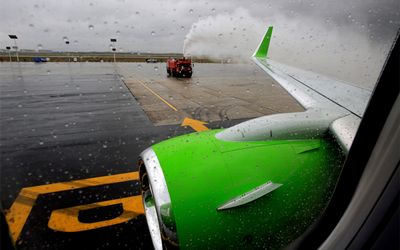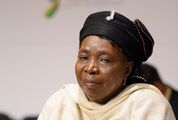COMAIR, which reported a near 50% decline in interim profits due to the weakening rand offsetting gains from a lower oil price, says continued upgrades to its fleet "remained the best solution to the expected recovery in fuel price".
The British Airways franchisee, which operates low-cost airline kulula.com, reported profit for the period ended December down nearly half to R83.7m from R163.6m in the previous corresponding period.
Operating costs had declined 2% due to the suppressed dollar price of oil, but the rand had declined 23% against the dollar in the interim period.
Maintenance, aircraft parts and fuel are just some of the input costs denominated in foreign currency.
A weaker rand led Comair to revalue the dollar denomination of a $27m loan for one aircraft which resulted in a R91m value increase in the company’s debt.
However, this is the only dollar-based loan Comair has.
Comair also suffered a R71m pre-tax loss on dollar-oil hedges contracted in mid-2014. The last of these expired in December, which meant there would be no further losses on these hedges in the second part of its financial year, the airline said.
However, the company expected the rand and oil price to remain volatile in the future.
"The forward price of oil is relatively high, so we will not be taking out any hedges for a while," Comair CEO Erik Venter said. He said Comair had just taken delivery of its seventh Boeing 737-800 aircraft, with the last of the new aircraft expected to arrive in November this year.
Both the aircraft would be for operation under the British Airways brand. In October, Comair took delivery of its sixth Boeing 737-800.
"The fleet upgrade is to replace aircraft that are becoming too expensive to operate, so they do not add additional capacity, but significantly improve efficiency," Mr Venter said.
Until about a year ago, Comair was doing reasonably well, but negative factors, such as increased competition, sharply rising costs, and the inability to raise fares, have built up.
In these circumstances, it has to try to compete with South African Airways (SAA), the state-subsidised, loss-making, technically insolvent national carrier, and its profitable low-cost airline, Mango.
SAA and Mango hold about 55% of the domestic airline market, and Comair, which operates under both the kulula.com and the British Airways brands, about 31%.
Earnings per share were cut in half to 18c per share from 37.6c per share in the comparative period.
The company declared an interim dividend of 10c per share, while a dividend of 13c per share was declared in the previous interim period.
However, profit before taxation, depreciation and foreign liability translation was down to R382m from R481m in the previous period.
Transport economist and aviation expert Joachim Vermooten said while the rand-dollar exchange rate had an effect on Comair’s results, the competitive domestic aviation market, had also brought down ticket prices.
"SAA and Mango have increased capacity much more than the other players in the market which drives down prices," said Mr Vermooten.
Passenger numbers grew 12.8% during the six months to December, compared to a stagnant customer market in the previous comparative period.
The increased passenger numbers were as a result of "aggressive pricing" in the market, according to Comair.

ON THE GROUND: A Kulula.com Boeing at Lanseria airport in Johannesburg. Picture: SUNDAY TIMES
COMAIR, which reported a near 50% decline in interim profits due to the weakening rand offsetting gains from a lower oil price, says continued upgrades to its fleet "remained the best solution to the expected recovery in fuel price".
The British Airways franchisee, which operates low-cost airline kulula.com, reported profit for the period ended December down nearly half to R83.7m from R163.6m in the previous corresponding period.
Operating costs had declined 2% due to the suppressed dollar price of oil, but the rand had declined 23% against the dollar in the interim period.
Maintenance, aircraft parts and fuel are just some of the input costs denominated in foreign currency.
A weaker rand led Comair to revalue the dollar denomination of a $27m loan for one aircraft which resulted in a R91m value increase in the company’s debt.
However, this is the only dollar-based loan Comair has.
Comair also suffered a R71m pre-tax loss on dollar-oil hedges contracted in mid-2014. The last of these expired in December, which meant there would be no further losses on these hedges in the second part of its financial year, the airline said.
However, the company expected the rand and oil price to remain volatile in the future.
"The forward price of oil is relatively high, so we will not be taking out any hedges for a while," Comair CEO Erik Venter said. He said Comair had just taken delivery of its seventh Boeing 737-800 aircraft, with the last of the new aircraft expected to arrive in November this year.
Both the aircraft would be for operation under the British Airways brand. In October, Comair took delivery of its sixth Boeing 737-800.
"The fleet upgrade is to replace aircraft that are becoming too expensive to operate, so they do not add additional capacity, but significantly improve efficiency," Mr Venter said.
Until about a year ago, Comair was doing reasonably well, but negative factors, such as increased competition, sharply rising costs, and the inability to raise fares, have built up.
In these circumstances, it has to try to compete with South African Airways (SAA), the state-subsidised, loss-making, technically insolvent national carrier, and its profitable low-cost airline, Mango.
SAA and Mango hold about 55% of the domestic airline market, and Comair, which operates under both the kulula.com and the British Airways brands, about 31%.
Earnings per share were cut in half to 18c per share from 37.6c per share in the comparative period.
The company declared an interim dividend of 10c per share, while a dividend of 13c per share was declared in the previous interim period.
However, profit before taxation, depreciation and foreign liability translation was down to R382m from R481m in the previous period.
Transport economist and aviation expert Joachim Vermooten said while the rand-dollar exchange rate had an effect on Comair’s results, the competitive domestic aviation market, had also brought down ticket prices.
"SAA and Mango have increased capacity much more than the other players in the market which drives down prices," said Mr Vermooten.
Passenger numbers grew 12.8% during the six months to December, compared to a stagnant customer market in the previous comparative period.
The increased passenger numbers were as a result of "aggressive pricing" in the market, according to Comair.























Change: 0.08%
Change: 0.07%
Change: 0.36%
Change: -0.14%
Change: 0.45%
Data supplied by Profile Data
Change: 0.68%
Change: -0.98%
Change: 0.08%
Change: 0.00%
Change: -1.20%
Data supplied by Profile Data
Change: -0.98%
Change: -0.57%
Change: -0.95%
Change: -1.64%
Change: -0.34%
Data supplied by Profile Data
Change: -0.40%
Change: 0.10%
Change: -0.07%
Change: 1.12%
Change: 1.66%
Data supplied by Profile Data